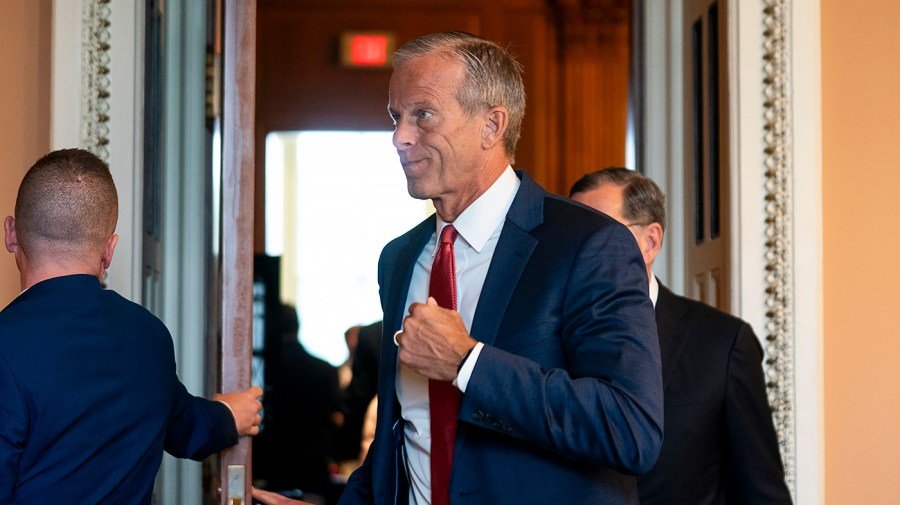
The Senate on Tuesday passed legislation creating a regulatory framework for payment stablecoins in a major milestone for the crypto industry.
Lawmakers voted 68-30 to pass the GENIUS Act, which seeks to establish rules of the road for the dollar-backed cryptocurrencies. It marks the first time that major crypto legislation has cleared the upper chamber. The bill now heads to the House.
“With the GENIUS Act, we’re bringing clarity to a sector that’s been clouded by uncertainty and proving that bipartisan, principled leadership can still deliver real results for the American people,” Senate Banking Chair Tim Scott (R-S.C.) said in a statement.
“This did not happen by accident,” he continued. “It happened because we led – across the aisle and with purpose.”
Eighteen Democrats joined with most Republicans to pass the legislation, which has trudged forward through a series of procedural hurdles on the Senate floor over the past four weeks.
Sen. Ruben Gallego (D-Ariz.), who was a lead negotiator for Democrats on the GENIUS Act, touted its passage as “proof of what can be achieved through honest negations and a willingness to work across the aisle.”
The stablecoin bill appeared to be sailing forward this spring after passing out of the Senate Banking Committee with the support of five Democrats.
However, the legislation briefly hit a roadblock in early May, when Senate leadership moved to bring the bill to the floor. A contingent of crypto-friendly Democrats pulled their support, alleging Republicans had cut off negotiations prematurely and tanking an initial vote on the Senate floor.
After two weeks of frantic negotiations, the two sides reached a deal on new bill text.
“With the GENIUS Act’s passage, we are meaningfully closer to a stablecoin regulatory landscape in the U.S. that provides clear rules of the road, protects consumers, and holds bad actors accountable,” Gallego said in a statement.
“I look forward to seeing this bill pass the House with equally strong bipartisan support and get signed into law,” he added.
House Financial Services Committee Chair French Hill (R-Ark.) applauded the bill’s passage Tuesday, saying it brings lawmakers “one step closer to creating a functional regulatory framework.”
His committee advanced their own stablecoin legislation, the STABLE Act, in April, but the bill has yet to come up for a vote on the House floor.
“I look forward to working with my House colleagues to bring much-needed clarity and protections to the digital asset ecosystem,” Hill said in a statement.
Several Democrats lamented the lack of provisions blocking President Trump from benefiting from stablecoins, which has become a key concern as the Trump family has increasingly expanded its crypto portfolio.
“Passing the GENIUS Act without strong anti-corruption measures stamps a Congressional seal of approval on President Trump selling access to the government for personal profit,” Sen. Jeff Merkley (D-Ore.) said in a statement.
“Republicans rammed through this fatally flawed legislation without considering any amendments on the Senate floor—despite promises of an open amendment process and debate before the American people,” he added.
Senate Majority Leader John Thune (R-S.D.) initially sought to pass the bill via “regular order,” allowing for amendments on the floor.
However, as several controversial amendments, including Sen. Roger Marshall’s (R-Kan.) Credit Card Competition Act, threatened to complicate the bill’s path forward, Thune opted to scrap the open amendment process.
The stablecoin bill’s passage in the Senate marks a key win for the crypto industry, as well as the Trump administration and GOP leadership, who have made it a priority to get both stablecoin and market structure legislation across the finish line before August.
Market structure legislation, which seeks to divvy up oversight of the rest of the digital asset market between two financial regulators, has moved slower than stablecoin legislation.
However, the House’s approach to market structure, the Digital Asset Market Clarity Act, advanced out of both the House Financial Services Committee and the House Agriculture Committee last week.
Updated at 6:49 p.m. EDT


